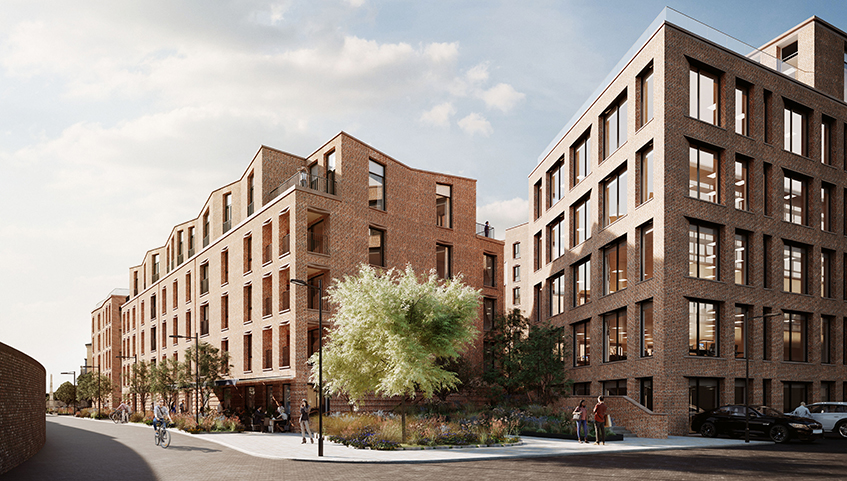“It’s not a load of work,” says Neil Sinclair of converting Palace Capital, the regionally focused property investment firm he oversees, into a real estate investment trust. “It just isn’t.”

Sinclair may be downplaying the process somewhat. The REIT conversion, which took place on 1 August, was the culmination of years of discussions between chief executive Sinclair and his colleagues over transforming their business from an operating company into an investment trust that will pay out at least 90% of its income as dividends.
But he does not downplay its importance. Becoming a REIT is the latest milestone on a journey that Sinclair wants to result in London-based Palace Capital boasting a market capitalisation of £500m, compared to about £134m today.
“We have to get to a £500m market cap,” says Sinclair in an interview at Palace Capital’s offices in St James’s, SW1, ahead of the conversion. “The fact of the matter is, we’re a small company and liquidity is an issue. You can’t ignore it. ‘You have to get bigger’, that’s what our shareholders are telling us. We’re working our socks off trying to do that.”
Right time to change
It is now close to a decade since Sinclair and chairman Stanley Davis bought and renamed Leo Insurance Services, a £108,000-market cap minnow on London’s junior stock market, AIM, with the intention of building a property company. Since then Palace Capital has raised more than £130m from shareholders to fund its dealmaking and amassed a commercial portfolio valued at £286.3m as of March. Significant investors in the company include Axa Investment Managers and J O Hambro.
Having moved from AIM to the London Stock Exchange’s main market last year, the conversion to a REIT is another change to Palace Capital’s listed life in quick succession. Sinclair says the team had been weighing up the shift for two or three years, speaking regularly with advisers at Deloitte, before he was convinced that the timing was right and that the perks around tax – profits and gains for property rental are tax-exempt for REITs – would be beneficial.
“Never mind Eurosceptics, I was a REIT sceptic,” he says. “Firstly, we thought we were too small. We wouldn’t have enough money. Secondly, because we bought companies that had losses in them, our tax bill was low. In consequence there was no real benefit to us in being tied to a REIT regime.”
You have to get bigger’, that’s what our shareholders are telling us. We’re working our socks off trying to do that.”
– Neil Sinclair
Now, he says, the company’s growing scale and desire to bring in new investors make it the right time. Analysts covering Palace Capital’s stock have welcomed the move. “We see [the REIT conversion] as being a positive step for the company, aligning itself with peers and supporting its determination to deliver strong total returns,” wrote Kunal Walia at Arden Partners, also Palace Capital’s broker, in a June note.
Walia added that he saw Palace Capital’s “proven track record” giving its shares the scope to trade closer to net asset value. At the time of his note, he said, they traded at a “significantly unjustified” 34% discount.
At Hardman & Co, Mike Foster has described the conversion as of “great significance” for shareholders, signalling a rise in earnings.

The move should also bring Palace Capital new sources of investment, says non-executive director Mickola Wilson, who joined the team in February. That, in turn, should improve liquidity in the company’s shares.
“Some [investors] actually don’t invest outside of the REIT regime,” says Wilson, a former chief executive of investment firm Teesland who now runs Seven Dials Fund Management. “It’s a familiar structure for them and so potentially there’s a broader investor base [for Palace Capital as a REIT] than there is at the moment.”
New firepower for acquisitions
Palace Capital has built its portfolio in the main by buying companies rather than individual assets. Its largest deal came in 2017 when it paid £53.3m to buy RT Warren, a company with a portfolio of commercial and residential properties valued at the time at almost £72m.
Sinclair says the team has been lucky to find businesses where owners are looking to cash out after generations of family ownership. “We’ve learned here: grandfathers found the business, their sons run the business, and the grandchildren sell the business,” he adds. He and the team expect to be back on the acquisition trail in due course.
“The advantage with acquisitions [as a REIT] is that you can buy a company that’s got inherent tax liabilities and you can eliminate them,” the chief executive adds.
Almost half of Palace Capital’s portfolio now comprises regional city centre offices, with the company steering clear of London and its relatively low returns. “We buy, we refurbish, we develop,” Sinclair says simply of the strategy. “And we increase [the properties’] values.”
The portfolio includes ambitious projects such as Hudson Quarter in York. The site was acquired as part of a £39m portfolio bought from Quintain back in 2013. Palace Capital is now overseeing what will be the first new mixed-use development in the city in a decade, with 35,000 sq ft of offices, 127 apartments and other commercial space due to complete in early 2021.

Such a project underlines Sinclair and colleagues’ focus on cities suffering from a lack of office stock because of permitted development rights, which have been used to turn existing office space into homes. “In York, the [office] vacancy rate is down to 3%,” Sinclair says. “If you talk to people there – and we’re members of the Chamber of Commerce – it’s a horrendous problem. Expanding companies can’t expand in York.”
Opportunities for the brave
Now preparing to mark 10 years in business, the team at Palace Capital is looking to the next decade. “I see opportunity in doing more development, selectively, in good areas,” Sinclair says. “I see opportunity for us, in the right time to buy more companies.”
But in the near term, there are challenges. The company made just one acquisition in its most recent financial year, spending £14m on One Derby Square, a retail and office property in Liverpool.
“What is most difficult at the moment is trying to find value, trying to find something where we can get a decent return,” Sinclair says. “We’re having to stretch far and wide and knock on more doors… At the moment we’re finding that a lot of properties are being withdrawn from the market, not actually being sold.”
Wilson adds: “We’ve got an overhang of expectation… There was a dislocation between owners and their expectations on valuation and what works from an investment or development point of view. That’s still there, that adjustment has still got to come. I think in the next year to 18 months there will be some painful adjustments.”
This, Wilson says, is where Palace Capital could find its moment to shine as a REIT. She wants the company to “get braver and be prepared to take a little more risk”, such as pulling down a property and rebuilding it rather than opting for a refurbishment. With that kind of approach, she adds, the company could take advantage of the “opportunities for the brave” that she expects to materialise in the coming years.
“You have to work property harder,” Wilson says. “Even a company the size of Palace can’t pretend that they’re always going to be able to buy something cheap in a misinformed market; that isn’t a strategy. The strategy has to be: we’ll find things with upside opportunity. Every few years you see that stage in the cycle where the people who make money out of property are those who work very hard and can see those opportunities… That’s what Palace is.”
To send feedback, e-mail tim.burke@egi.co.uk or tweet @_tim_burke or @estatesgazette











